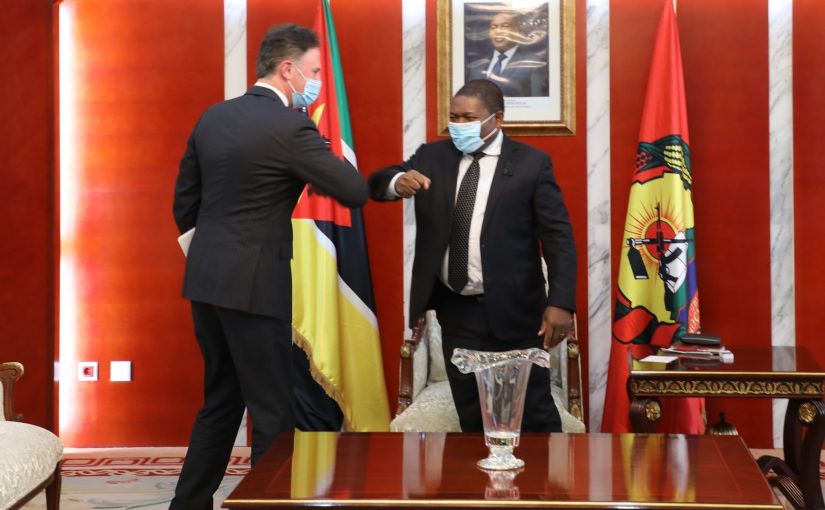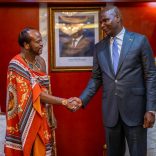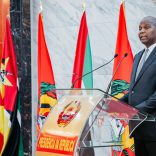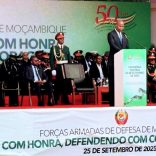Mozambique: Chapo arrives in Quelimane for Zambézia working visit - Watch
Mozambique: US prepared to suppport counter-terrorism, but no troops – AIM report

File photo: US Embassy in Mozambique
The United States is not considering sending troops to Mozambique to combat the terrorist threat in the northern province of Cabo Delgado, but it is willing to boost “civilian counter-terrorism capabilities”, said the US Coordinator for Counter-terrorism, Nathan Sales, on Tuesday.
He was speaking in a telephone press briefing, after visiting Mozambique and South Africa. Sales described his trip as an “opportunity to engage with government officials in both countries to garner support for increased cooperation on counterterrorism issues”.
The fact that he travelled to southern Africa, despite the Covid-19 pandemic “is an indication of how seriously the United States takes the terror situation on that part of the continent”.
Sales had no doubt that the terrorist raids in Cabo Delgado are the work of the jihadi organization known variously as Islamic State, ISIS or Daesh. “What we’ve seen is increased terrorist attacks by ISIS affiliates in Mozambique over the last three years, resulting in the deaths of more than 2,000 people”, he said. “We’re also seeing a humanitarian situation developing with the displacement of more than 400,000 residents of Cabo Delgado province”
“Here in the United States, our key priorities are to assist counterterrorism with security support, while protecting the civilian population and providing humanitarian assistance to those who have been displaced by violence”, he added.
In his discussions in Maputo with President Filipe Nyusi and other Mozambican officials, “we discussed our two countries’ mutual commitment to a strong strategic partnership to counter terrorism in Cabo Delgado”, Sales said. “We also explored ways the United States can help Mozambique enhance its civilian law enforcement capabilities as well as its border security capabilities.”
“The United States wants to be Mozambique’s security partner of choice in strengthening border security and in strengthening its capacity to counter terrorist activity”, he stressed. “We do this time and again by demonstrating across the globe that the United States is the indispensable counterterrorism partner; that the United States brings capabilities that no other country can match”.
As for possible military assistance, Sales pointed out that he represents the US State Department, not the Defence Department.
“Typically what the State Department has done in other parts of the world is to help bolster law enforcement capabilities, things like the ability to investigate terrorist attacks, to prevent terrorist attacks, to collect evidence from the battlefield, to train prosecutors to use that evidence in courts of law to obtain convictions that will take terrorists off the battlefield for prolonged sentences upon their conviction”, he said.
Sales stressed the importance of border security. “We have a number of state-of-the-art systems that we use in the United States to protect our borders, airports, seaports, land ports of entry, and we always talk to our friends around the world about how those systems might usefully by used to protect their border security”, he said. “We’d like to see whether there’s an interest in moving forward with those in Mozambique as well”.
Sales described human rights and the rule of law as fundamental “because we’ve found that boosting those rule-of-law capabilities enables a long-term, durable, and sustainable capability that’s going to pay dividends over many years to come”.
“There’s no quick fix when it comes to counterterrorism”, he said. “The playbook is a simple one, but it’s one that we have to follow with specificity. And it’s very simple: it’s to develop rule-of-law-compliant capabilities so that police and investigators and prosecutors and judges have the tools they need to defeat terrorists in a sustainable and durable way”.
Asked about the threat the Cabo Delgado war poses to other southern African countries, Sales said “one of the things we’ve seen with terrorist groups like ISIS time and again is that they don’t respect national boundaries, and in fact they do their best to exploit national borders.”
An example of this was the recent incursion by Cabo Delgado jihadists into southern Tanzania. This was what made border security so crucial, he stressed, “We think that working with our partners on the ground, we will be able to coordinate our efforts better to contain terrorists, to degrade them, and ultimately to defeat them. But ultimately that requires maintaining control over borders and making sure the terrorists don’t have freedom of movement across international boundaries”.
Sales believed that South Africa “has a special role to play here as an economic power, as a military power, as a strong democracy that much of the rest of the continent looks to for inspiration and leadership. So I hope that we’ll be able to find ways to partner together with our friends in Pretoria to degrade and defeat terrorist threats in this part of the continent”.
Sales denied suggestions that the Cabo Delgado conflict was a “locally driven war”. He replied that although the province had known “spasms of violence” in the past “what’s new within the past several years, is that the perpetrators of this violence are aligning themselves with ISIS as a transnational terrorist enterprise in ways that we hadn’t really seen previously. So regardless of the origins of these violent networks or individuals who participate in them, what we’re seeing today is a committed ISIS affiliate that embraces the ISIS ideology, that embraces the ISIS tactics and procedures, and that embraces the ISIS vision of a caliphate with territorial control”.
Sales rejected attempts to link terrorism to factors such as poverty and unemployment. “We don’t see the link between lack of economic opportunity and jihadist terrorist groups like ISIS and al-Qaida being particularly pronounced around the world”, he said. “Usama bin Ladin was not a pauper. The 19 hijackers who perpetrated the 9/11 attacks were, in many cases, highly educated and had plenty of economic opportunities awaiting them. They instead chose the path of violence, the path of bloodshed and destruction”.
As for whether the Mozambican government would actually accept an offer of US assistance, Sales said “what I got very clearly from my stay in Mozambique was that the Government is taking this threat extremely seriously. I think they recognize that the United States is in a position to offer some assistance that is first-rate, world-class, both training and equipment to help manage this problem and help defeat terrorist networks”.
“Once we have more clarity about what the precise contours of our partnership could look like, I’m sure we’ll be in a position to share that information”, he added. “But as things stand right now, I think what we have is a meeting of the minds on the need to work together and a willingness to have further conversations about how we can defeat this shared enemy”.













Leave a Reply
Be the First to Comment!
You must be logged in to post a comment.
You must be logged in to post a comment.